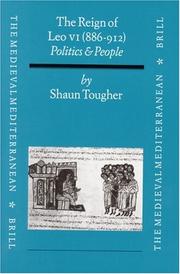| Listing 1 - 3 of 3 |
Sort by
|
Book
ISBN: 1108650058 1107281962 110857274X 9781108572743 Year: 2018 Publisher: Cambridge : Cambridge University Press,
Abstract | Keywords | Export | Availability | Bookmark
 Loading...
Loading...Choose an application
- Reference Manager
- EndNote
- RefWorks (Direct export to RefWorks)
The Byzantine emperor Leo VI (886-912), was not a general or even a soldier, like his predecessors, but a scholar, and it was the religious education he gained under the tutelage of the patriarch Photios that was to distinguish him as an unusual ruler. This book analyses Leo's literary output, focusing on his deployment of ideological principles and religious obligations to distinguish the characteristics of the Christian oikoumene from the Islamic caliphate, primarily in his military manual known as the Taktika. It also examines in depth his 113 legislative Novels, with particular attention to their theological prolegomena, showing how the emperor's religious sensibilities find expression in his reshaping of the legal code to bring it into closer accord with Byzantine canon law. Meredith L. D. Riedel argues that the impact of his religious faith transformed Byzantine cultural identity and influenced his successors, establishing the Macedonian dynasty as a 'golden age' in Byzantium.
Identification (Religion) --- Identity (Psychology) --- Identity (Religion) --- Religious identity --- Psychology, Religious --- History --- Religious aspects --- Christianity. --- Leo --- Leo, --- Leon --- Leon, --- Leone --- Leone, --- Leōn, --- Leōn --- Autokratōr Leōn --- Byzantine Empire
Multi
ISBN: 9069800969 9789069800967 Year: 1996 Publisher: Groningen: Forsten,
Abstract | Keywords | Export | Availability | Bookmark
 Loading...
Loading...Choose an application
- Reference Manager
- EndNote
- RefWorks (Direct export to RefWorks)
Law,Byzantine --- Sources. --- Leo --- Basil --- Procheiros nomos. --- Ecloga. --- Eisagoge. --- 34 <495> --- Rechtswetenschappen.--Griekenland --- Theses --- 34 <495> Rechtswetenschappen.--Griekenland --- Sources --- Leo, --- Leon --- Leon, --- Leone --- Leone, --- Leōn, --- Leōn --- Autokratōr Leōn --- Basil, --- Basileios --- Basilio --- Basilius --- Law, Byzantine --- Law, Byzantine - Sources --- Leo - VI, - Emperor of the East, - 866-912. --- Basil - I, - Emperor of the East, - ca. 812-886.

ISSN: 09285520 ISBN: 9004108114 9004477586 9789004108110 9789004477582 Year: 1997 Volume: v. 15 Publisher: Leiden; Boston : BRILL
Abstract | Keywords | Export | Availability | Bookmark
 Loading...
Loading...Choose an application
- Reference Manager
- EndNote
- RefWorks (Direct export to RefWorks)
The focus of this book is the Byzantine emperor Leo VI (886-912) and his reign. He has been characterised as a careless and ineffectual emperor, but this work presents a more considered account of Leo and the politics of his age. Initial chapters on sources and the broader historical context are provided before particular aspects of Leo's life and reign are presented in eight chapters, arranged so as to give a rough chronological framework. Subjects discussed include relations with family and officials, imperial ideology, and ecclesiastical and military affairs. By drawing on a broad spectrum of primary evidence the book illustrates that Leo forged a distinctive imperial style as a literate city-based non-campaigning emperor, and argues that he was actively concerned about the problems that faced his empire.
Leo --- Byzantine Empire --- Empire byzantin --- Kings and rulers --- History --- Rois et souverains --- Histoire --- Middle Ages. --- 949.5.02 --- Middle Ages --- Dark Ages --- History, Medieval --- Medieval history --- Medieval period --- World history, Medieval --- World history --- Civilization, Medieval --- Medievalism --- Renaissance --- Geschiedenis van Byzantium: Leo III tot Michael VI--(716-1057) --- Leo VI, Emperor of the East --- -History --- -Middle Ages. --- -949.5.02 --- 949.5.02 Geschiedenis van Byzantium: Leo III tot Michael VI--(716-1057) --- -Leo --- Leo, --- Leon --- Leon, --- Leone --- Leone, --- Leōn, --- Leōn --- Autokratōr Leōn --- Byzantine Empire - History - Leo VI, 886-911. --- Léon VI le Sage --- Emperors
| Listing 1 - 3 of 3 |
Sort by
|

 Search
Search Feedback
Feedback About UniCat
About UniCat  Help
Help News
News